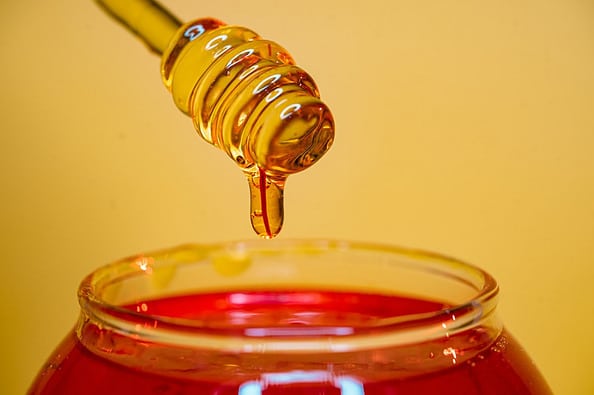Honey is known to have a number of health benefits for the human body. In addition, Manuka Honey has the best effectiveness among all honey types. It is the most expensive type of honey for several reasons. In this article, we will discuss those reasons.
What Is Manuka Honey?
It is a type of honey produced mainly in New Zealand and, to a lesser extent, in Australia. Its special properties and potential health benefits can be attributed to its unique composition and bioactive compounds, such as methylglyoxal (MGO), which is found in high concentrations in Manuka honey.
Purchasing it should only be done from products with a verified UMF rating to ensure you are getting a genuine and high-quality product.
Features of Manuka Honey
- Source
Manuka honey is produced by honeybees that collect nectar from the manuka tree’s flowers (Leptospermum scoparium). Manuka trees are only found in New Zealand and in some parts of Australia.
2. Unique Chemical Composition
It contains a higher concentration of MGO(Methylglyoxal)compared to most other types of honey. MGO is a natural compound that exhibits antimicrobial and antibacterial properties, making it especially prized for its potential therapeutic benefits.
3. Antibacterial Properties
The high levels of MGO in Manuka honey have made it a popular natural remedy for wound care and overall wellness for centuries. It is believed to help fight bacterial infections and promote healing.
4. UMF (Unique Manuka Factor)
Manuka honey is often rated and graded using the Unique Manuka Factor scale, or UMF.
The UMF rating indicates the level of MGO and other compounds in the honey, providing a measure of its potency. Higher UMF ratings are associated with greater therapeutic potential.
5. Flavor and Texture
Manuka honey has a distinctive flavor that is often described as earthy, rich, and slightly bitter, with notes of caramel or butterscotch. Its texture can vary from runny to creamy, depending on factors such as temperature and moisture content.
6. Therapeutic Uses
Manuka honey is commonly used in natural remedies for various health issues, including sore throats, digestive discomfort, and skin conditions. It is also used in wound dressings for its potential antibacterial and wound-healing properties.
7. Quality Standards
Authentic Manuka honey is subject to strict quality standards and regulations in New Zealand and Australia. These standards help ensure the authenticity and quality of the product. Let us See where
Difference Between Regular Honey and Manuka Honey
|
(For 1 tbsp) |
MANUKA HONEY |
REGULAR HONEY |
|
Calories |
70 |
64 |
|
Protein |
2 g |
0.06g |
|
Sugars |
8g |
17g |
|
Carbohydrates |
8g |
17g |
From above, it is clear that manuka honey has less sugar,less carbs and a high protein content.
Benefits of Manuka Honey
Manuka honey is renowned for its potential health benefits, largely attributed to its unique chemical composition, particularly its high levels of methylglyoxal (MGO)
and other bioactive compounds. Here are some of the potential benefits:
1. Antibacterial and Antimicrobial Properties
Manuka honey’s high MGO content gives it strong antibacterial and antimicrobial properties. Bacterial infections, including ones in the throat and digestive system, can be treated with it because it inhibits the growth of harmful bacteria.
2. Wound Healing
It has been used for centuries in wound care. Its antibacterial properties can help prevent infection, while its natural enzymes and acidic pH promote wound healing and tissue regeneration. It is used in some medical settings as a topical treatment for wounds and burns.
3. Sore Throat Relief
Manuka honey can soothe a sore throat and help alleviate symptoms of upper respiratory infections. You can mix it with warm water or herbal tea to create a soothing drink.
4. Cough Suppressant
Its thick consistency can coat the throat and provide relief from coughing and irritation. It may be used as a natural cough suppressant.
5. Digestive Health
Some people use it to support their digestive health. It may help with conditions like acid reflux and gastritis. However, more research is needed to fully understand its effects on the digestive system.
6. Immune System Support
The antioxidants and natural compounds in Manuka honey may help support the immune system by reducing oxidative stress and inflammation.
7. Oral Health
Manuka honey may have benefits for oral health. Some toothpaste and mouthwash products also contain it for its potential ability to reduce oral bacteria and promote gum health.
8. Skin Care
It can be used in skincare products due to its potential skin benefits. It may help soothe and moisturize the skin and is sometimes used to address issues like acne, eczema, and dry skin.
9. Antioxidant Properties
It contains antioxidants that can help protect cells from damage caused by free radicals. Antioxidants play a role in overall health and may reduce the risk of chronic diseases.
10. Overall Wellness
Many people consume Manuka honey regularly as part of a balanced diet to promote overall health and well-being. It’s a natural sweetener that provides energy and nutrition.
Though it has shown potential health benefits in various studies and in traditional use, not all honey labeled as “Manuka” contains the same level of health benefits. The Unique Manuka Factor (UMF) rating system is often used to gauge the quality and potency of Manuka honey. Higher UMF ratings indicate higher levels of MGO and potential benefits.
Let’s come to our main topic.
Why is Manuka Honey So expensive?
Here are 8 main reasons why it is so expensive.
1. Limited geographical distribution
Manuka honey is produced primarily in New Zealand and, to a lesser extent, in Australia. The manuka tree (Leptospermum scoparium), from which bees collect nectar to make honey, grows in specific regions with the right climate and soil conditions. This limited geographical distribution makes it more challenging to produce compared to honey sourced from a wider variety of flowers.
2. Seasonal and weather-dependent production
The production of Manuka honey depends on the flowering season of the manuka tree, which can vary from year to year and region to region. Weather conditions, such as rainfall and temperature, also impact the quantity and quality of honey produced. These factors make its production less predictable and more susceptible to fluctuations in supply.
3. Labor-intensive harvesting
Collecting Manuka honey can be more labor-intensive than harvesting honey from other sources. Beekeepers often have to transport their hives to remote areas with manuka trees in bloom, and the bees must travel long distances to forage for nectar. This increases the cost of production.
4. Unique properties and health benefits
It is renowned for its unique antibacterial properties due to the presence of a compound called methylglyoxal (MGO). This compound gives Manuka honey its distinct therapeutic qualities, making it popular for medicinal use, particularly in wound care and natural remedies. The demand for honey with high MGO levels drives up its price.
5. Stringent quality standards
Authentic Manuka honey is subject to strict quality standards and regulations in New Zealand and Australia. These standards include testing for MGO levels and other markers to ensure authenticity and quality. The rigorous testing and certification processes add to the overall cost of production.
6. Marketing and branding
The reputation of Manuka Honey as a premium, high-quality product has been cultivated through extensive marketing and branding efforts. This positioning in the market allows producers to charge a premium price.
7. Limited shelf life
It has a limited shelf life due to its natural composition and antibacterial properties. As a result, it may need to be processed and packaged with extra care to maintain its quality, which can increase production costs.
8. International demand
It has gained popularity worldwide for its perceived health benefits and unique flavor. The global demand for it has driven up prices as producers try to meet this demand.
CONCLUSION
Manuka honey is one of the most expensive types of honey due to certain reasons. Some of them are limited production areas, variable production conditions, labor-intensive harvesting, unique properties, strict quality standards, marketing efforts, and international demand. All these factors contribute to making it one of the most expensive types of honey available. But its effectiveness is also higher than other types.
RELATED ARTICLE:
HOW DO BEES MAKE HONEY AND ITS BENEFITS
Here are some recommendations for Purchasing Manuka Honey


I never tried Manuka Honney, probblaby because I never heard of it, so this article was very informative. I would like to try this honey, but i didn’t findd out where can I buy it, and what is the price. If I don’t know the price, I cannot judge if it is expensive or not, at least to me. If you have this information, please share it with me. I found some local Manuka honney but I don’t know if it is the real deal. I have been suffering with gastritis for years now, and I hope that it can help me. Thanks for the information.
Manuka Honey has gained popularity recently due to its amazing benefits. It is helpful for gastroenteritis and gut health.
Regular consumption of 1 tbsp of honey a day(either raw honey or manuka honey) has been linked with many long-term benefits.
I have added some product links below in the article that you can consider buying. Thanks for the appreciation.